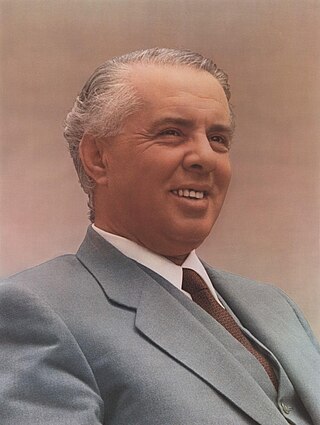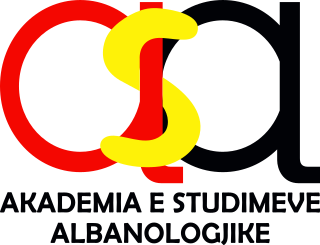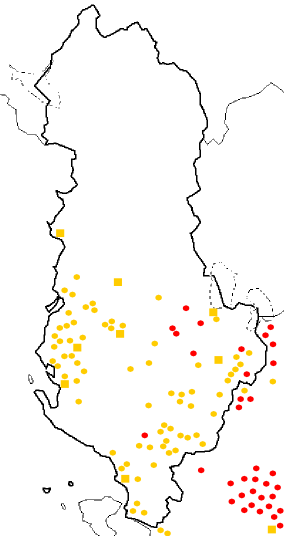Related Research Articles

Albania, officially the Republic of Albania, is a country in Southeast Europe. The country is located in the Balkans on the Adriatic and Ionian Seas within the Mediterranean Sea and shares land borders with Montenegro to the northwest, Kosovo to the northeast, North Macedonia to the east and Greece to the south. Spanning an area of 28,748 km2 (11,100 sq mi), it displays a varied range of climatic, geological, hydrological and morphological conditions. The country's landscapes range from rugged snow-capped mountains in the Albanian Alps and the Korab, Skanderbeg, Pindus and Ceraunian Mountains, to fertile lowland plains extending from the coasts of the Adriatic and Ionian seas. Tirana is the capital and largest city in the country, followed by Durrës, Vlorë, and Shkodër.

Enver Hoxha was an Albanian Communist politician who was the dictator of Albania from 1944 until his death in 1985. He was First Secretary of the Party of Labour of Albania from 1941 until his death, a member of its Politburo, chairman of the Democratic Front of Albania, and commander-in-chief of the Albanian People's Army. He was the twenty-second prime minister of Albania from 1944 to 1954 and at various times was both foreign minister and defence minister of the country.

Skopje is the capital and largest city of North Macedonia. It is the country's political, cultural, economic, and academic centre. Skopje lies in the Skopje Basin.

Tirana is the capital and largest city of Albania. It is located in the centre of the country, enclosed by mountains and hills with Dajti rising to the east and a slight valley to the northwest overlooking the Adriatic Sea in the distance. It is among the wettest and sunniest cities in Europe, with 2,544 hours of sun per year.
The foreign relations of Albania are its relations with other governments and peoples. Foreign relations are conducted through the Ministry of Foreign Affairs in Tirana. The current minister is Olta Xhaçka. The current Ambassador to the United Nations is Ferit Hoxha.
Albania is a unitary parliamentary constitutional republic, in which the president of Albania is the head of state and the prime minister of Albania is the head of government in a multi-party system. The executive power is exercised by the Government and the prime minister with its Cabinet. Legislative power is vested in the Parliament of Albania. The judiciary is independent of the executive and the legislature. The political system of Albania is laid out in the 1998 constitution. The Parliament adopted the current constitution on 28 November 1998. Historically Albania has had many constitutions. Initially constituted as a monarchy in 1913, Albania became briefly a republic in 1925, and then a authoritarian monarchy in 1928. In 1939 Albania was invaded by Fascist Italian forces, imposing a puppet state, and later occupied by Nazi German forces. Following the partisan liberation from the Nazis in 1944 a provisional government was formed, which by 1946 had transformed into a communist one-party state. In March 1991 democracy was restored with multi-party elections.

Skënder Gjinushi is an Albanian politician and academic. He has served in several high-ranking positions in the Albanian government, including as Speaker of Parliament and Deputy Prime Minister. He founded the Social Democratic Party of Albania and served as its chairman from 1991 to 2019. He is currently serving as the president of the Academy of Sciences of Albania.

Përmet is a city and municipality in Gjirokastër County, southern Albania. The municipality of Përmet consists of the administrative units of Çarçovë, Frashër, Petran, Qendër Piskovë and Përmet. The total population is 10,614, in a total area of 602.47 km2. The population of the former municipality at the 2011 census was 5,945. It is flanked by the Vjosë river, which runs along the Trebeshinë-Dhëmbel-Nemërçkë mountain chain, between Trebeshinë and Dhëmbel mountains, and through the Këlcyrë Gorge.

The London Conference of 1912–1913, also known as the London Peace Conference or the Conference of the Ambassadors, was an international summit of the six Great Powers of that time convened in December 1912 due to the successes of the Balkan League armies against the Ottoman Empire in the First Balkan War. In particular, the conference intended to arbitrate between the warring powers as to territorial acquisitions, and also to determine the future of Albania, whose independence was proclaimed during the conflict.

Horë-Vranisht is a village and a former municipality in the Vlorë County, southwestern Albania. At the 2015 local government reform it became a subdivision of the municipality Himarë. The population at the 2011 census was 2,080. The municipal unit consists of the villages Vranisht, Kuç, Bolenë, Kallarat and Tërbaç.

The Academy of Sciences of Albania, founded in 1972, is the most important scientific institution in Albania. In the 1980s, several research institutes began at the University of Tirana were transferred to the Academy's jurisdiction. The institution includes the most distinguished scientists, also called "academics", that are involved in research centers and other organisations inside and outside Albania. As of 2009, the Academy had 23 regular members, 10 associated members, one permanent member, and 26 honor members.
Beqir Balluku was an Albanian politician, military leader, and Minister of Defense of Albania. Balluku assisted Enver Hoxha in carrying out the 1956 purge within the Party of Labour. However, in 1974, Balluku himself, along with a group of other government members was accused by Hoxha of an attempted coup d'état against the Albanian People's Republic. He was executed the next year.

The Committee for the National Defence of Kosovo was an Albanian organization founded in Shkodër on 1 May 1918. It was mainly consisted of the political exiles from Kosovo and was led by Hoxha Kadri from Pristina. It existed in looser form since May 1915.

Andrea Shundi is an Albanian-American agronomist of the 20th and 21st century. His academic research and publications focus mainly on the forage systems as a source feeding of the livestock, on viticulture and viniculture, and also on the history of the Albanian agriculture.

Independent Albania was a parliamentary state declared in Vlorë on 28 November 1912 during the First Balkan War. Its assembly was constituted on the same day while its government and senate were established on 5 December 1912.

Studime Historike is a scientific magazine on albanology. It is published by the Institute of History, part of the Centre of Albanological Studies in Tirana, Albania.
It is profilised as a bulletin short studies or articles dealing with Albanian history, from antiquity to nowadays. Beside historical thematic, it publishes studies presented in scientific events as conferences and symposiums, archival documents, pieces of historical memoirs and materials, information of scientific activities organised by the Institute of History, etc.
It provides information of latest publications of the Albanian Institute of History, both Albanian and foreign albanologists.

The Academy of Albanological Studies is the main institution of albanology in Albania.

Shaban Demiraj was an Albanian albanologist, linguist, professor at the University of Tirana from 1972–1990, and chairman of the Academy of Sciences of Albania during the period of 1993–1997.

The Aromanians in Albania are an officially recognised ethnic minority in Albania.

Afërdita Veveçka Priftaj was an Albanian physicist, associate of the Academy of Sciences of Albania and a professor at the Polytechnic University of Tirana. Her research specialized on metals, evaluating their microstructure and mechanical properties, and the effects of severe plastic deformation on nanocrystalline materials.
References
- ↑ "ANËTARË TË RREGULLT TË AKADEMISË SË SHKENCAVE TË SHQIPËRISË" (in Albanian). Tirana: Academy of Sciences of Albania. Archived from the original on 2 March 2012. Retrieved 20 February 2012.
Meta Beqir, Histori
- ↑ Mehmet HACISALİHOĞLUU, Fuat AKS, ed. (2007). Proceedings of the International Conference on MINORITY ISSUES IN THE BALKANS AND THE EU (PDF). Istanbul. p. 14. Archived from the original (PDF) on 29 March 2012. Retrieved 20 February 2012.
Beqir Meta has published several studies on Greek-Albanian relations.
{{cite book}}: CS1 maint: location missing publisher (link) - ↑ "Scientific Committee". Mother Teresa Museum. Archived from the original on 4 September 2012. Retrieved 24 February 2012.
Prof. Beqir Meta Director of The Albanian National History Museum, where The Museum of Mother Teresa is located.